Leadership and Management for Hospitality: Crown Hotel Report
VerifiedAdded on 2023/01/11
|11
|3072
|69
Report
AI Summary
This report provides a comprehensive analysis of leadership and management principles within the hospitality industry, using the Crown Hotel as a case study. It begins by exploring classical management theories, such as Max Weber's bureaucracy theory and F.W. Taylor's scientific management, and their relevance to the sector. The report then delves into the roles of a leader, various leadership styles (including democratic and persuasive styles), and their practical application within the hotel. A comparative analysis of different management and leadership styles is conducted, followed by an evaluation of the current management and leadership approach at Crown Hotel. The report further examines talent management as a contemporary model, investigating both internal and external factors that influence talent management strategies, such as globalization and stakeholder influence. A critical perspective is offered on how changes in management styles can be facilitated through talent management strategies, followed by an overview of hard and soft skills essential for current and future leadership and management roles in the hospitality industry. The report also discusses the role of talent management in employee retention, development of training programs, and the importance of leadership skills and talent management for the overall success of the sector.
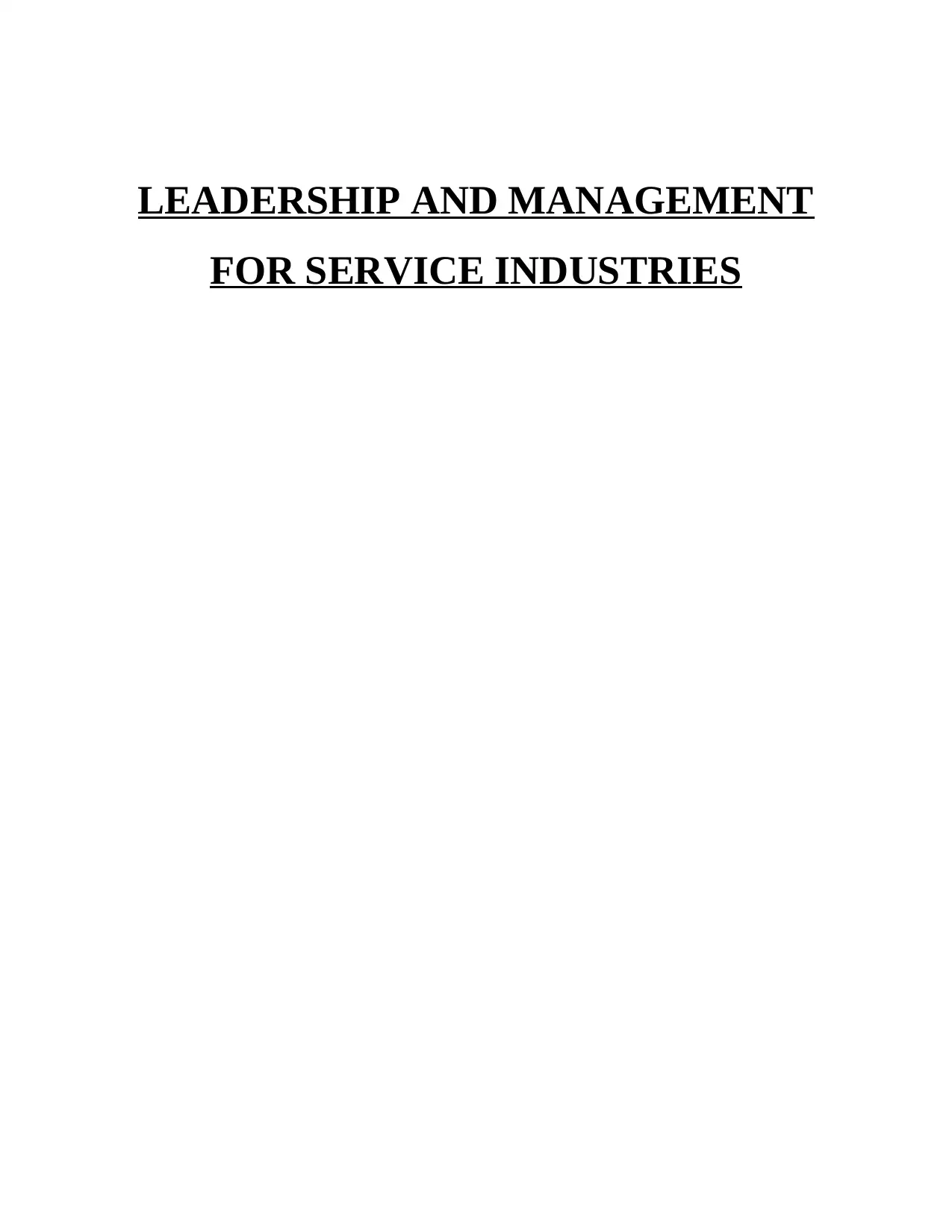
LEADERSHIP AND MANAGEMENT
FOR SERVICE INDUSTRIES
FOR SERVICE INDUSTRIES
Paraphrase This Document
Need a fresh take? Get an instant paraphrase of this document with our AI Paraphraser
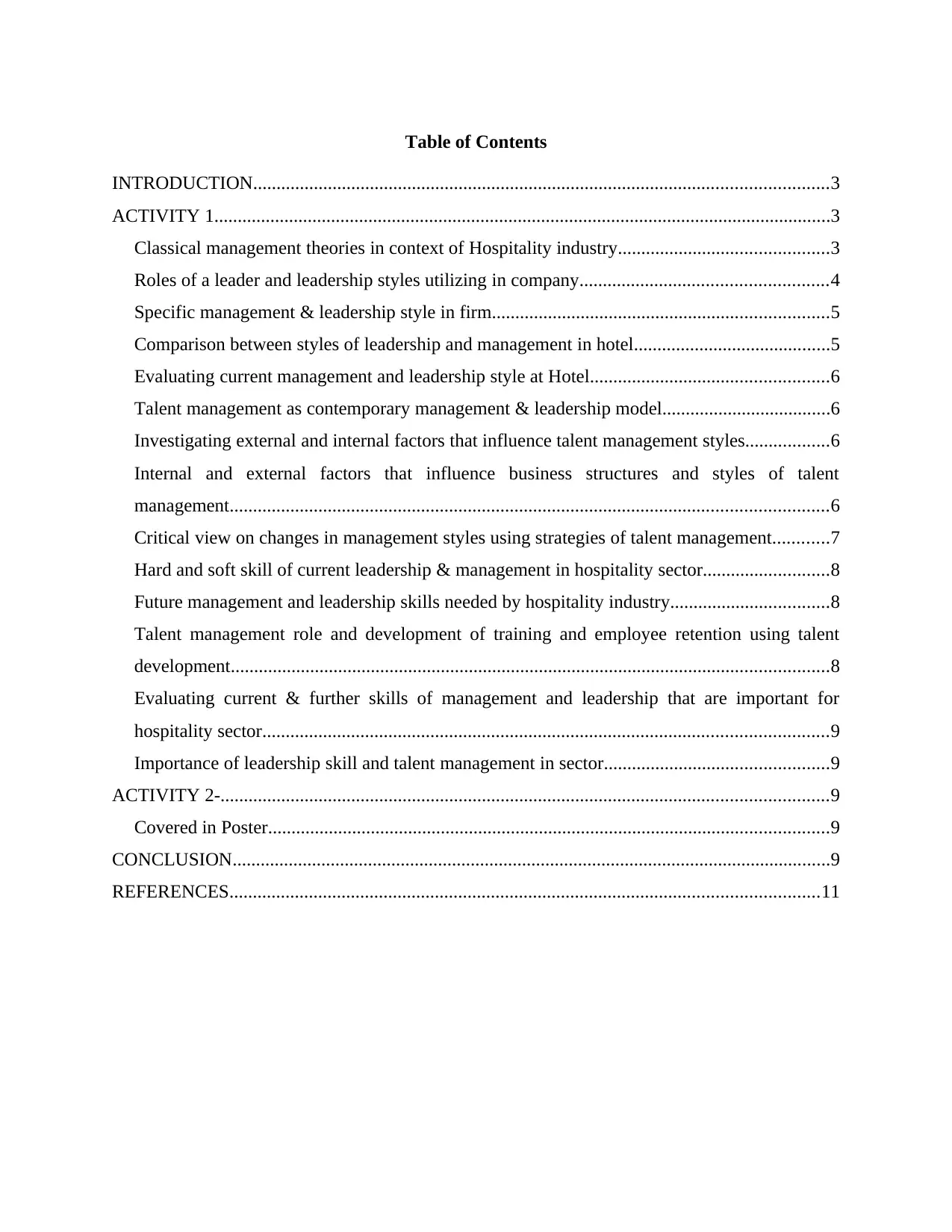
Table of Contents
INTRODUCTION...........................................................................................................................3
ACTIVITY 1....................................................................................................................................3
Classical management theories in context of Hospitality industry.............................................3
Roles of a leader and leadership styles utilizing in company.....................................................4
Specific management & leadership style in firm........................................................................5
Comparison between styles of leadership and management in hotel..........................................5
Evaluating current management and leadership style at Hotel...................................................6
Talent management as contemporary management & leadership model....................................6
Investigating external and internal factors that influence talent management styles..................6
Internal and external factors that influence business structures and styles of talent
management................................................................................................................................6
Critical view on changes in management styles using strategies of talent management............7
Hard and soft skill of current leadership & management in hospitality sector...........................8
Future management and leadership skills needed by hospitality industry..................................8
Talent management role and development of training and employee retention using talent
development................................................................................................................................8
Evaluating current & further skills of management and leadership that are important for
hospitality sector.........................................................................................................................9
Importance of leadership skill and talent management in sector................................................9
ACTIVITY 2-..................................................................................................................................9
Covered in Poster........................................................................................................................9
CONCLUSION................................................................................................................................9
REFERENCES..............................................................................................................................11
INTRODUCTION...........................................................................................................................3
ACTIVITY 1....................................................................................................................................3
Classical management theories in context of Hospitality industry.............................................3
Roles of a leader and leadership styles utilizing in company.....................................................4
Specific management & leadership style in firm........................................................................5
Comparison between styles of leadership and management in hotel..........................................5
Evaluating current management and leadership style at Hotel...................................................6
Talent management as contemporary management & leadership model....................................6
Investigating external and internal factors that influence talent management styles..................6
Internal and external factors that influence business structures and styles of talent
management................................................................................................................................6
Critical view on changes in management styles using strategies of talent management............7
Hard and soft skill of current leadership & management in hospitality sector...........................8
Future management and leadership skills needed by hospitality industry..................................8
Talent management role and development of training and employee retention using talent
development................................................................................................................................8
Evaluating current & further skills of management and leadership that are important for
hospitality sector.........................................................................................................................9
Importance of leadership skill and talent management in sector................................................9
ACTIVITY 2-..................................................................................................................................9
Covered in Poster........................................................................................................................9
CONCLUSION................................................................................................................................9
REFERENCES..............................................................................................................................11
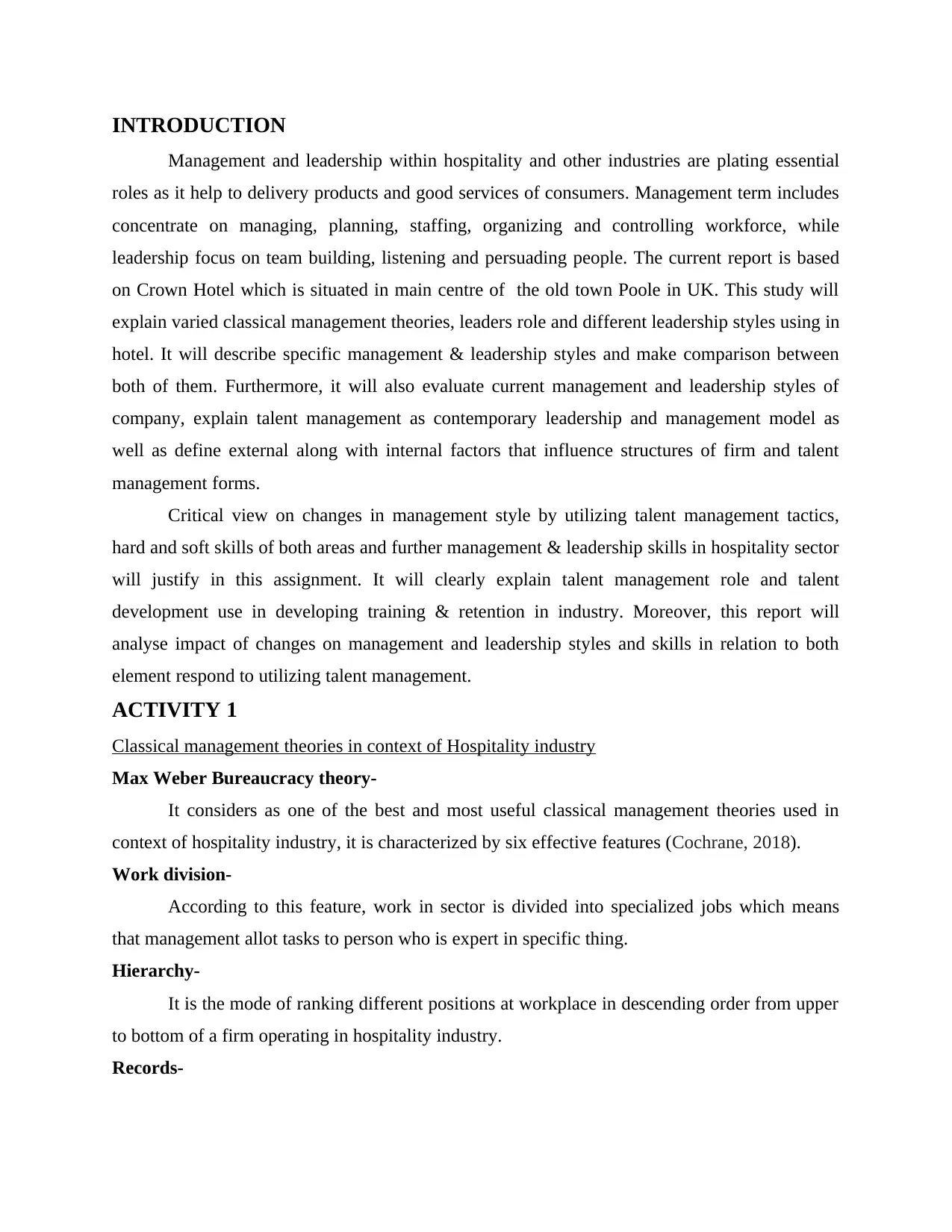
INTRODUCTION
Management and leadership within hospitality and other industries are plating essential
roles as it help to delivery products and good services of consumers. Management term includes
concentrate on managing, planning, staffing, organizing and controlling workforce, while
leadership focus on team building, listening and persuading people. The current report is based
on Crown Hotel which is situated in main centre of the old town Poole in UK. This study will
explain varied classical management theories, leaders role and different leadership styles using in
hotel. It will describe specific management & leadership styles and make comparison between
both of them. Furthermore, it will also evaluate current management and leadership styles of
company, explain talent management as contemporary leadership and management model as
well as define external along with internal factors that influence structures of firm and talent
management forms.
Critical view on changes in management style by utilizing talent management tactics,
hard and soft skills of both areas and further management & leadership skills in hospitality sector
will justify in this assignment. It will clearly explain talent management role and talent
development use in developing training & retention in industry. Moreover, this report will
analyse impact of changes on management and leadership styles and skills in relation to both
element respond to utilizing talent management.
ACTIVITY 1
Classical management theories in context of Hospitality industry
Max Weber Bureaucracy theory-
It considers as one of the best and most useful classical management theories used in
context of hospitality industry, it is characterized by six effective features (Cochrane, 2018).
Work division-
According to this feature, work in sector is divided into specialized jobs which means
that management allot tasks to person who is expert in specific thing.
Hierarchy-
It is the mode of ranking different positions at workplace in descending order from upper
to bottom of a firm operating in hospitality industry.
Records-
Management and leadership within hospitality and other industries are plating essential
roles as it help to delivery products and good services of consumers. Management term includes
concentrate on managing, planning, staffing, organizing and controlling workforce, while
leadership focus on team building, listening and persuading people. The current report is based
on Crown Hotel which is situated in main centre of the old town Poole in UK. This study will
explain varied classical management theories, leaders role and different leadership styles using in
hotel. It will describe specific management & leadership styles and make comparison between
both of them. Furthermore, it will also evaluate current management and leadership styles of
company, explain talent management as contemporary leadership and management model as
well as define external along with internal factors that influence structures of firm and talent
management forms.
Critical view on changes in management style by utilizing talent management tactics,
hard and soft skills of both areas and further management & leadership skills in hospitality sector
will justify in this assignment. It will clearly explain talent management role and talent
development use in developing training & retention in industry. Moreover, this report will
analyse impact of changes on management and leadership styles and skills in relation to both
element respond to utilizing talent management.
ACTIVITY 1
Classical management theories in context of Hospitality industry
Max Weber Bureaucracy theory-
It considers as one of the best and most useful classical management theories used in
context of hospitality industry, it is characterized by six effective features (Cochrane, 2018).
Work division-
According to this feature, work in sector is divided into specialized jobs which means
that management allot tasks to person who is expert in specific thing.
Hierarchy-
It is the mode of ranking different positions at workplace in descending order from upper
to bottom of a firm operating in hospitality industry.
Records-
⊘ This is a preview!⊘
Do you want full access?
Subscribe today to unlock all pages.

Trusted by 1+ million students worldwide
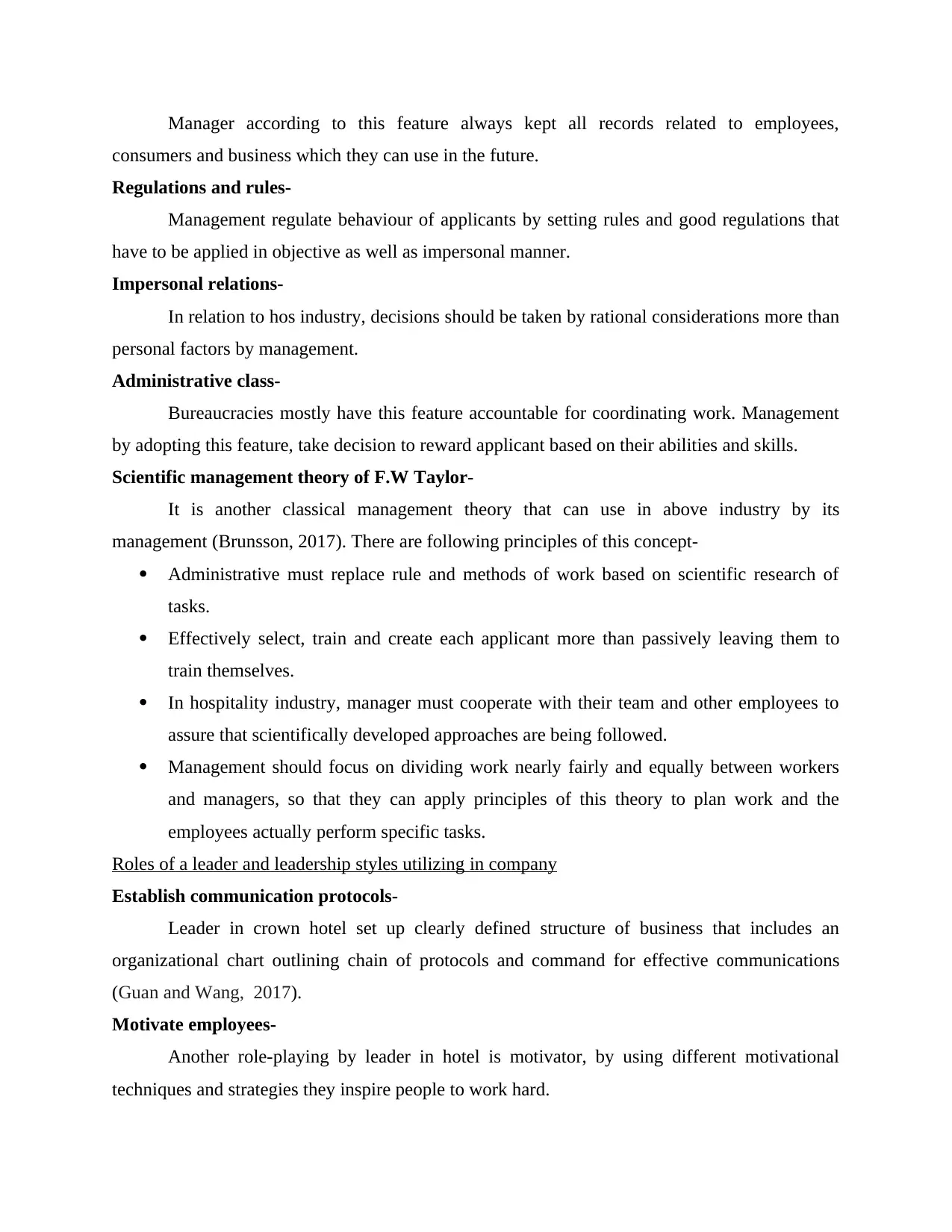
Manager according to this feature always kept all records related to employees,
consumers and business which they can use in the future.
Regulations and rules-
Management regulate behaviour of applicants by setting rules and good regulations that
have to be applied in objective as well as impersonal manner.
Impersonal relations-
In relation to hos industry, decisions should be taken by rational considerations more than
personal factors by management.
Administrative class-
Bureaucracies mostly have this feature accountable for coordinating work. Management
by adopting this feature, take decision to reward applicant based on their abilities and skills.
Scientific management theory of F.W Taylor-
It is another classical management theory that can use in above industry by its
management (Brunsson, 2017). There are following principles of this concept-
Administrative must replace rule and methods of work based on scientific research of
tasks.
Effectively select, train and create each applicant more than passively leaving them to
train themselves.
In hospitality industry, manager must cooperate with their team and other employees to
assure that scientifically developed approaches are being followed.
Management should focus on dividing work nearly fairly and equally between workers
and managers, so that they can apply principles of this theory to plan work and the
employees actually perform specific tasks.
Roles of a leader and leadership styles utilizing in company
Establish communication protocols-
Leader in crown hotel set up clearly defined structure of business that includes an
organizational chart outlining chain of protocols and command for effective communications
(Guan and Wang, 2017).
Motivate employees-
Another role-playing by leader in hotel is motivator, by using different motivational
techniques and strategies they inspire people to work hard.
consumers and business which they can use in the future.
Regulations and rules-
Management regulate behaviour of applicants by setting rules and good regulations that
have to be applied in objective as well as impersonal manner.
Impersonal relations-
In relation to hos industry, decisions should be taken by rational considerations more than
personal factors by management.
Administrative class-
Bureaucracies mostly have this feature accountable for coordinating work. Management
by adopting this feature, take decision to reward applicant based on their abilities and skills.
Scientific management theory of F.W Taylor-
It is another classical management theory that can use in above industry by its
management (Brunsson, 2017). There are following principles of this concept-
Administrative must replace rule and methods of work based on scientific research of
tasks.
Effectively select, train and create each applicant more than passively leaving them to
train themselves.
In hospitality industry, manager must cooperate with their team and other employees to
assure that scientifically developed approaches are being followed.
Management should focus on dividing work nearly fairly and equally between workers
and managers, so that they can apply principles of this theory to plan work and the
employees actually perform specific tasks.
Roles of a leader and leadership styles utilizing in company
Establish communication protocols-
Leader in crown hotel set up clearly defined structure of business that includes an
organizational chart outlining chain of protocols and command for effective communications
(Guan and Wang, 2017).
Motivate employees-
Another role-playing by leader in hotel is motivator, by using different motivational
techniques and strategies they inspire people to work hard.
Paraphrase This Document
Need a fresh take? Get an instant paraphrase of this document with our AI Paraphraser
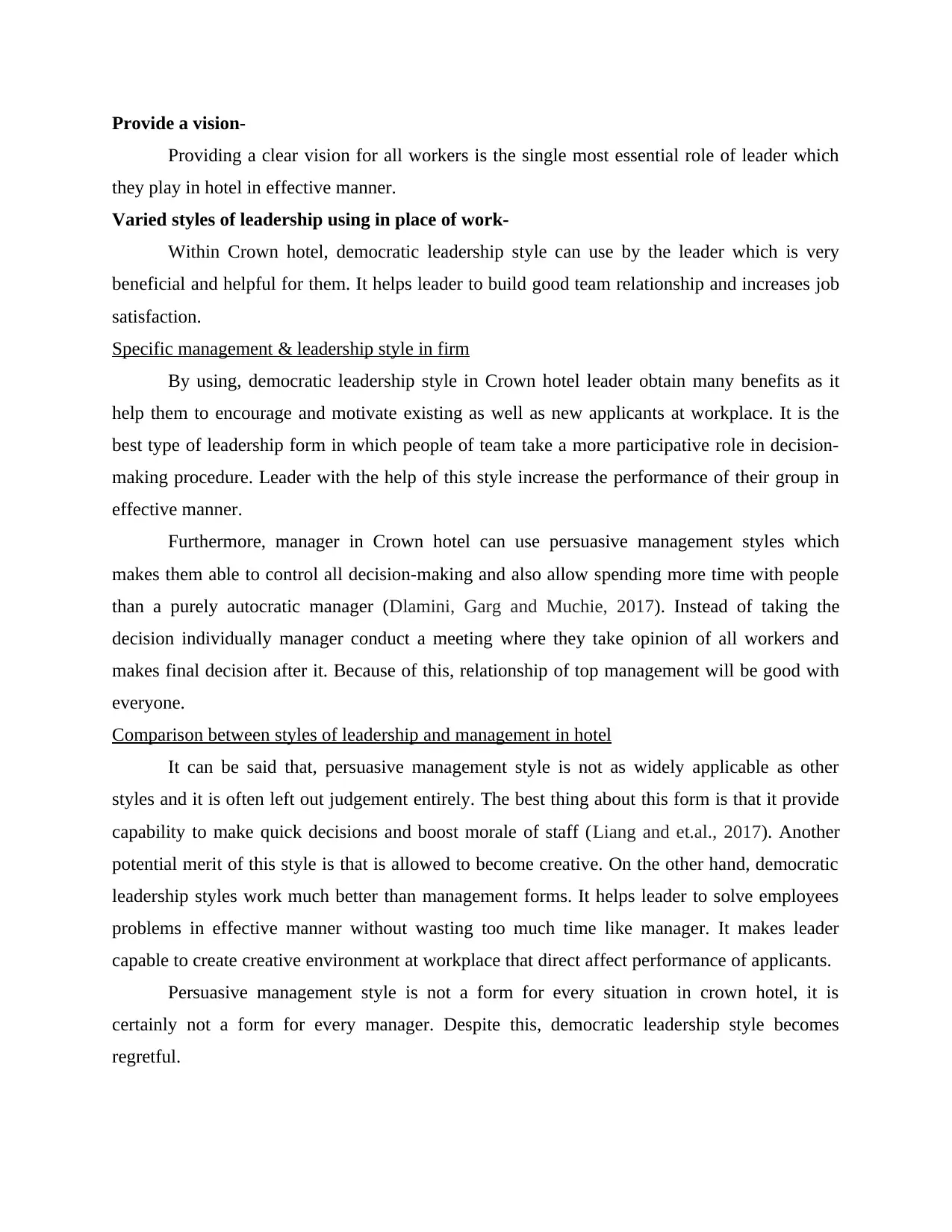
Provide a vision-
Providing a clear vision for all workers is the single most essential role of leader which
they play in hotel in effective manner.
Varied styles of leadership using in place of work-
Within Crown hotel, democratic leadership style can use by the leader which is very
beneficial and helpful for them. It helps leader to build good team relationship and increases job
satisfaction.
Specific management & leadership style in firm
By using, democratic leadership style in Crown hotel leader obtain many benefits as it
help them to encourage and motivate existing as well as new applicants at workplace. It is the
best type of leadership form in which people of team take a more participative role in decision-
making procedure. Leader with the help of this style increase the performance of their group in
effective manner.
Furthermore, manager in Crown hotel can use persuasive management styles which
makes them able to control all decision-making and also allow spending more time with people
than a purely autocratic manager (Dlamini, Garg and Muchie, 2017). Instead of taking the
decision individually manager conduct a meeting where they take opinion of all workers and
makes final decision after it. Because of this, relationship of top management will be good with
everyone.
Comparison between styles of leadership and management in hotel
It can be said that, persuasive management style is not as widely applicable as other
styles and it is often left out judgement entirely. The best thing about this form is that it provide
capability to make quick decisions and boost morale of staff (Liang and et.al., 2017). Another
potential merit of this style is that is allowed to become creative. On the other hand, democratic
leadership styles work much better than management forms. It helps leader to solve employees
problems in effective manner without wasting too much time like manager. It makes leader
capable to create creative environment at workplace that direct affect performance of applicants.
Persuasive management style is not a form for every situation in crown hotel, it is
certainly not a form for every manager. Despite this, democratic leadership style becomes
regretful.
Providing a clear vision for all workers is the single most essential role of leader which
they play in hotel in effective manner.
Varied styles of leadership using in place of work-
Within Crown hotel, democratic leadership style can use by the leader which is very
beneficial and helpful for them. It helps leader to build good team relationship and increases job
satisfaction.
Specific management & leadership style in firm
By using, democratic leadership style in Crown hotel leader obtain many benefits as it
help them to encourage and motivate existing as well as new applicants at workplace. It is the
best type of leadership form in which people of team take a more participative role in decision-
making procedure. Leader with the help of this style increase the performance of their group in
effective manner.
Furthermore, manager in Crown hotel can use persuasive management styles which
makes them able to control all decision-making and also allow spending more time with people
than a purely autocratic manager (Dlamini, Garg and Muchie, 2017). Instead of taking the
decision individually manager conduct a meeting where they take opinion of all workers and
makes final decision after it. Because of this, relationship of top management will be good with
everyone.
Comparison between styles of leadership and management in hotel
It can be said that, persuasive management style is not as widely applicable as other
styles and it is often left out judgement entirely. The best thing about this form is that it provide
capability to make quick decisions and boost morale of staff (Liang and et.al., 2017). Another
potential merit of this style is that is allowed to become creative. On the other hand, democratic
leadership styles work much better than management forms. It helps leader to solve employees
problems in effective manner without wasting too much time like manager. It makes leader
capable to create creative environment at workplace that direct affect performance of applicants.
Persuasive management style is not a form for every situation in crown hotel, it is
certainly not a form for every manager. Despite this, democratic leadership style becomes
regretful.
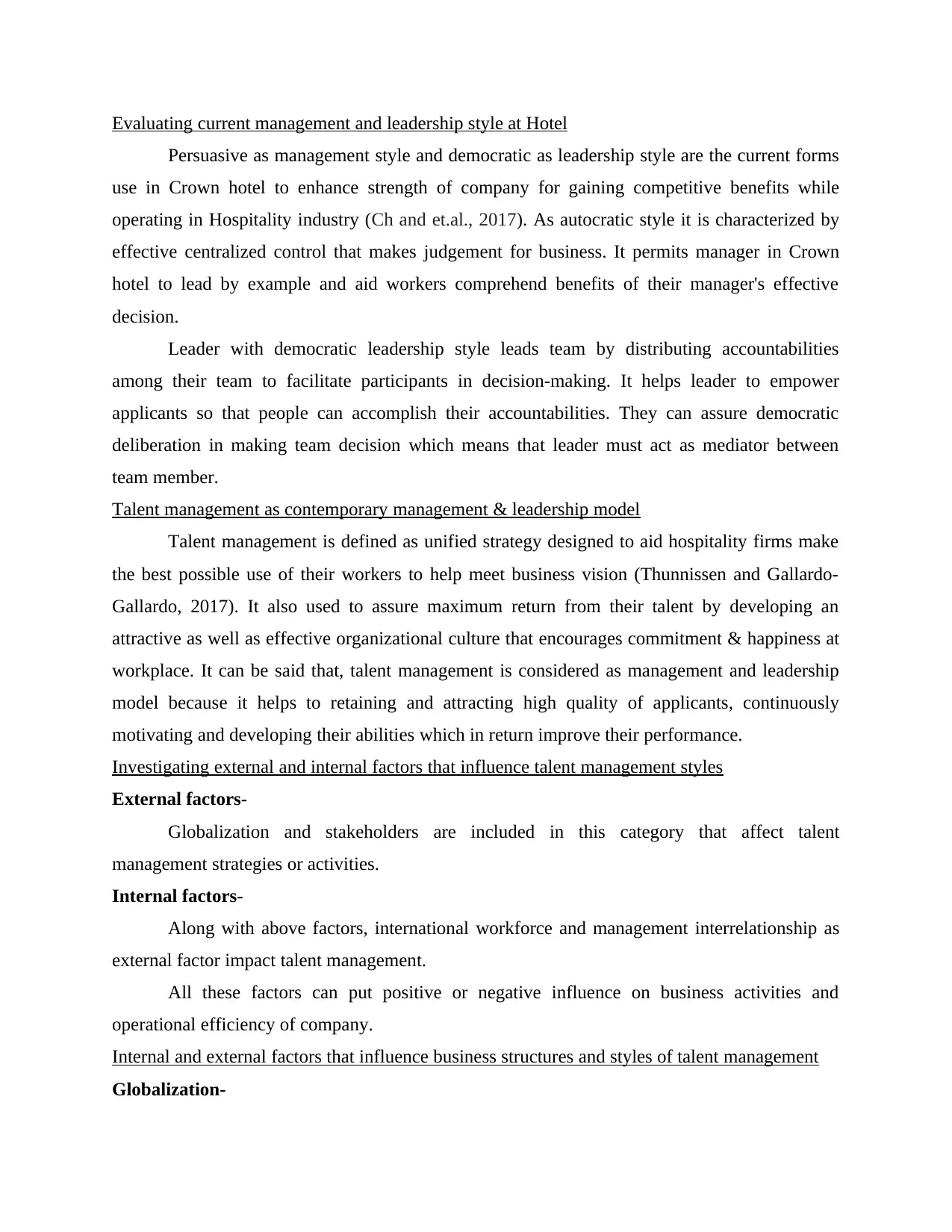
Evaluating current management and leadership style at Hotel
Persuasive as management style and democratic as leadership style are the current forms
use in Crown hotel to enhance strength of company for gaining competitive benefits while
operating in Hospitality industry (Ch and et.al., 2017). As autocratic style it is characterized by
effective centralized control that makes judgement for business. It permits manager in Crown
hotel to lead by example and aid workers comprehend benefits of their manager's effective
decision.
Leader with democratic leadership style leads team by distributing accountabilities
among their team to facilitate participants in decision-making. It helps leader to empower
applicants so that people can accomplish their accountabilities. They can assure democratic
deliberation in making team decision which means that leader must act as mediator between
team member.
Talent management as contemporary management & leadership model
Talent management is defined as unified strategy designed to aid hospitality firms make
the best possible use of their workers to help meet business vision (Thunnissen and Gallardo-
Gallardo, 2017). It also used to assure maximum return from their talent by developing an
attractive as well as effective organizational culture that encourages commitment & happiness at
workplace. It can be said that, talent management is considered as management and leadership
model because it helps to retaining and attracting high quality of applicants, continuously
motivating and developing their abilities which in return improve their performance.
Investigating external and internal factors that influence talent management styles
External factors-
Globalization and stakeholders are included in this category that affect talent
management strategies or activities.
Internal factors-
Along with above factors, international workforce and management interrelationship as
external factor impact talent management.
All these factors can put positive or negative influence on business activities and
operational efficiency of company.
Internal and external factors that influence business structures and styles of talent management
Globalization-
Persuasive as management style and democratic as leadership style are the current forms
use in Crown hotel to enhance strength of company for gaining competitive benefits while
operating in Hospitality industry (Ch and et.al., 2017). As autocratic style it is characterized by
effective centralized control that makes judgement for business. It permits manager in Crown
hotel to lead by example and aid workers comprehend benefits of their manager's effective
decision.
Leader with democratic leadership style leads team by distributing accountabilities
among their team to facilitate participants in decision-making. It helps leader to empower
applicants so that people can accomplish their accountabilities. They can assure democratic
deliberation in making team decision which means that leader must act as mediator between
team member.
Talent management as contemporary management & leadership model
Talent management is defined as unified strategy designed to aid hospitality firms make
the best possible use of their workers to help meet business vision (Thunnissen and Gallardo-
Gallardo, 2017). It also used to assure maximum return from their talent by developing an
attractive as well as effective organizational culture that encourages commitment & happiness at
workplace. It can be said that, talent management is considered as management and leadership
model because it helps to retaining and attracting high quality of applicants, continuously
motivating and developing their abilities which in return improve their performance.
Investigating external and internal factors that influence talent management styles
External factors-
Globalization and stakeholders are included in this category that affect talent
management strategies or activities.
Internal factors-
Along with above factors, international workforce and management interrelationship as
external factor impact talent management.
All these factors can put positive or negative influence on business activities and
operational efficiency of company.
Internal and external factors that influence business structures and styles of talent management
Globalization-
⊘ This is a preview!⊘
Do you want full access?
Subscribe today to unlock all pages.

Trusted by 1+ million students worldwide
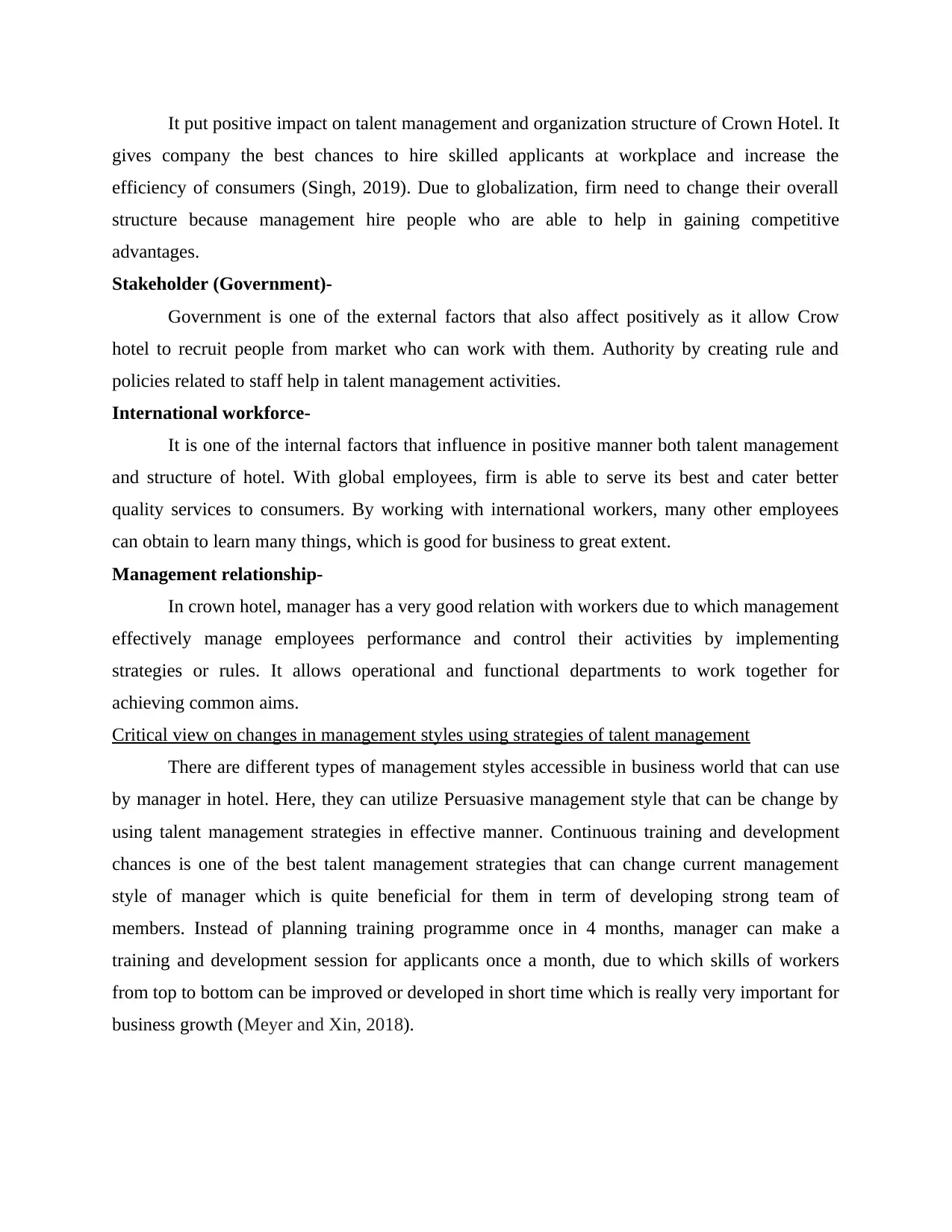
It put positive impact on talent management and organization structure of Crown Hotel. It
gives company the best chances to hire skilled applicants at workplace and increase the
efficiency of consumers (Singh, 2019). Due to globalization, firm need to change their overall
structure because management hire people who are able to help in gaining competitive
advantages.
Stakeholder (Government)-
Government is one of the external factors that also affect positively as it allow Crow
hotel to recruit people from market who can work with them. Authority by creating rule and
policies related to staff help in talent management activities.
International workforce-
It is one of the internal factors that influence in positive manner both talent management
and structure of hotel. With global employees, firm is able to serve its best and cater better
quality services to consumers. By working with international workers, many other employees
can obtain to learn many things, which is good for business to great extent.
Management relationship-
In crown hotel, manager has a very good relation with workers due to which management
effectively manage employees performance and control their activities by implementing
strategies or rules. It allows operational and functional departments to work together for
achieving common aims.
Critical view on changes in management styles using strategies of talent management
There are different types of management styles accessible in business world that can use
by manager in hotel. Here, they can utilize Persuasive management style that can be change by
using talent management strategies in effective manner. Continuous training and development
chances is one of the best talent management strategies that can change current management
style of manager which is quite beneficial for them in term of developing strong team of
members. Instead of planning training programme once in 4 months, manager can make a
training and development session for applicants once a month, due to which skills of workers
from top to bottom can be improved or developed in short time which is really very important for
business growth (Meyer and Xin, 2018).
gives company the best chances to hire skilled applicants at workplace and increase the
efficiency of consumers (Singh, 2019). Due to globalization, firm need to change their overall
structure because management hire people who are able to help in gaining competitive
advantages.
Stakeholder (Government)-
Government is one of the external factors that also affect positively as it allow Crow
hotel to recruit people from market who can work with them. Authority by creating rule and
policies related to staff help in talent management activities.
International workforce-
It is one of the internal factors that influence in positive manner both talent management
and structure of hotel. With global employees, firm is able to serve its best and cater better
quality services to consumers. By working with international workers, many other employees
can obtain to learn many things, which is good for business to great extent.
Management relationship-
In crown hotel, manager has a very good relation with workers due to which management
effectively manage employees performance and control their activities by implementing
strategies or rules. It allows operational and functional departments to work together for
achieving common aims.
Critical view on changes in management styles using strategies of talent management
There are different types of management styles accessible in business world that can use
by manager in hotel. Here, they can utilize Persuasive management style that can be change by
using talent management strategies in effective manner. Continuous training and development
chances is one of the best talent management strategies that can change current management
style of manager which is quite beneficial for them in term of developing strong team of
members. Instead of planning training programme once in 4 months, manager can make a
training and development session for applicants once a month, due to which skills of workers
from top to bottom can be improved or developed in short time which is really very important for
business growth (Meyer and Xin, 2018).
Paraphrase This Document
Need a fresh take? Get an instant paraphrase of this document with our AI Paraphraser
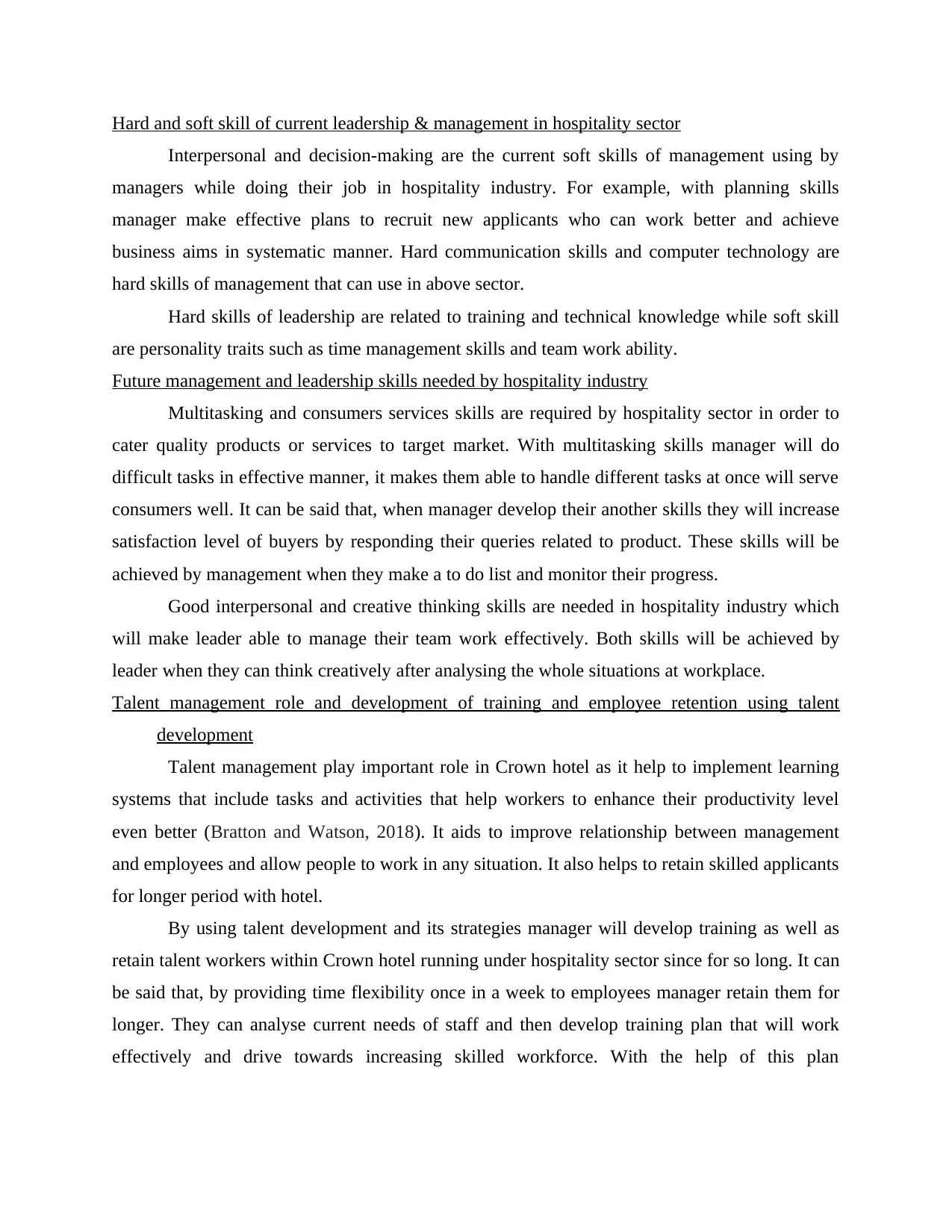
Hard and soft skill of current leadership & management in hospitality sector
Interpersonal and decision-making are the current soft skills of management using by
managers while doing their job in hospitality industry. For example, with planning skills
manager make effective plans to recruit new applicants who can work better and achieve
business aims in systematic manner. Hard communication skills and computer technology are
hard skills of management that can use in above sector.
Hard skills of leadership are related to training and technical knowledge while soft skill
are personality traits such as time management skills and team work ability.
Future management and leadership skills needed by hospitality industry
Multitasking and consumers services skills are required by hospitality sector in order to
cater quality products or services to target market. With multitasking skills manager will do
difficult tasks in effective manner, it makes them able to handle different tasks at once will serve
consumers well. It can be said that, when manager develop their another skills they will increase
satisfaction level of buyers by responding their queries related to product. These skills will be
achieved by management when they make a to do list and monitor their progress.
Good interpersonal and creative thinking skills are needed in hospitality industry which
will make leader able to manage their team work effectively. Both skills will be achieved by
leader when they can think creatively after analysing the whole situations at workplace.
Talent management role and development of training and employee retention using talent
development
Talent management play important role in Crown hotel as it help to implement learning
systems that include tasks and activities that help workers to enhance their productivity level
even better (Bratton and Watson, 2018). It aids to improve relationship between management
and employees and allow people to work in any situation. It also helps to retain skilled applicants
for longer period with hotel.
By using talent development and its strategies manager will develop training as well as
retain talent workers within Crown hotel running under hospitality sector since for so long. It can
be said that, by providing time flexibility once in a week to employees manager retain them for
longer. They can analyse current needs of staff and then develop training plan that will work
effectively and drive towards increasing skilled workforce. With the help of this plan
Interpersonal and decision-making are the current soft skills of management using by
managers while doing their job in hospitality industry. For example, with planning skills
manager make effective plans to recruit new applicants who can work better and achieve
business aims in systematic manner. Hard communication skills and computer technology are
hard skills of management that can use in above sector.
Hard skills of leadership are related to training and technical knowledge while soft skill
are personality traits such as time management skills and team work ability.
Future management and leadership skills needed by hospitality industry
Multitasking and consumers services skills are required by hospitality sector in order to
cater quality products or services to target market. With multitasking skills manager will do
difficult tasks in effective manner, it makes them able to handle different tasks at once will serve
consumers well. It can be said that, when manager develop their another skills they will increase
satisfaction level of buyers by responding their queries related to product. These skills will be
achieved by management when they make a to do list and monitor their progress.
Good interpersonal and creative thinking skills are needed in hospitality industry which
will make leader able to manage their team work effectively. Both skills will be achieved by
leader when they can think creatively after analysing the whole situations at workplace.
Talent management role and development of training and employee retention using talent
development
Talent management play important role in Crown hotel as it help to implement learning
systems that include tasks and activities that help workers to enhance their productivity level
even better (Bratton and Watson, 2018). It aids to improve relationship between management
and employees and allow people to work in any situation. It also helps to retain skilled applicants
for longer period with hotel.
By using talent development and its strategies manager will develop training as well as
retain talent workers within Crown hotel running under hospitality sector since for so long. It can
be said that, by providing time flexibility once in a week to employees manager retain them for
longer. They can analyse current needs of staff and then develop training plan that will work
effectively and drive towards increasing skilled workforce. With the help of this plan
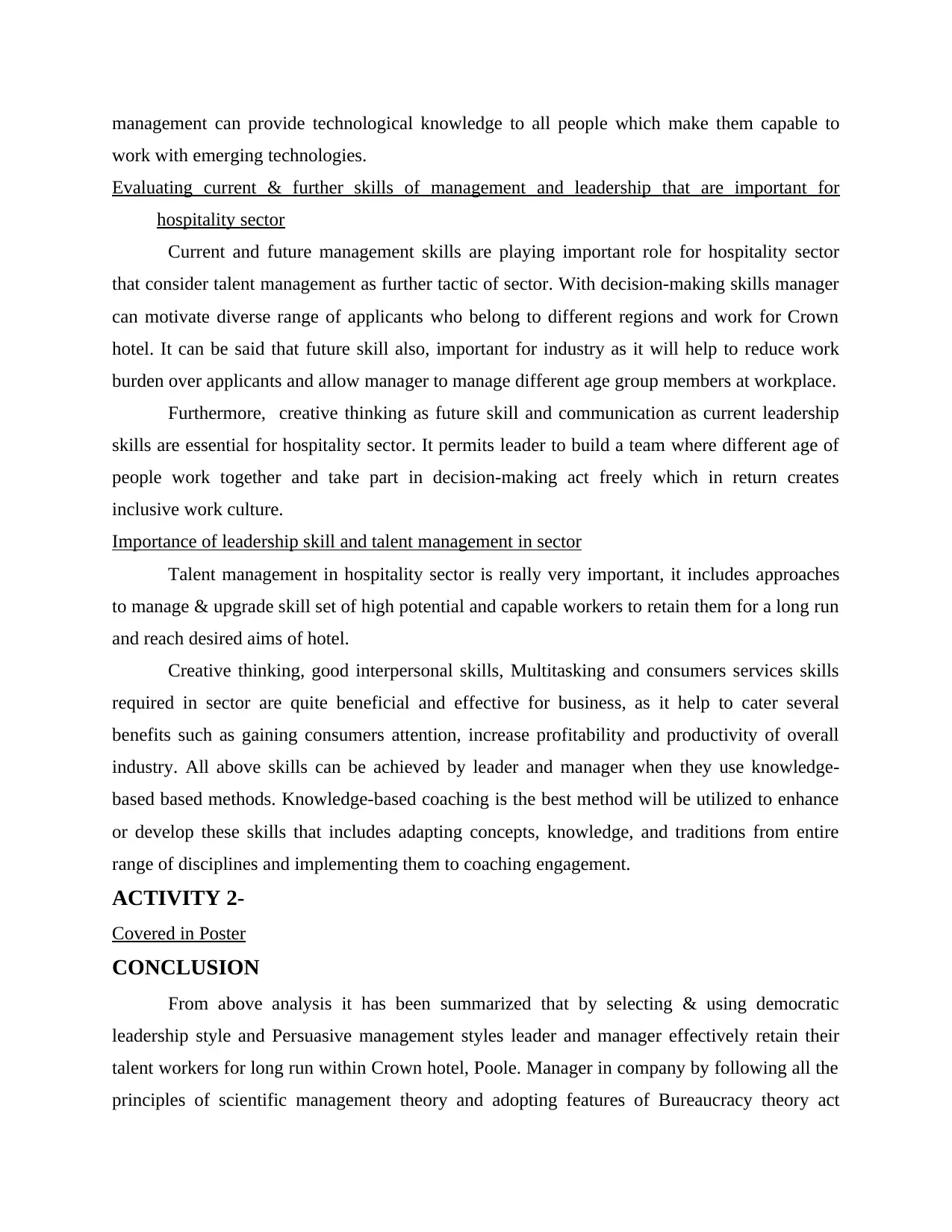
management can provide technological knowledge to all people which make them capable to
work with emerging technologies.
Evaluating current & further skills of management and leadership that are important for
hospitality sector
Current and future management skills are playing important role for hospitality sector
that consider talent management as further tactic of sector. With decision-making skills manager
can motivate diverse range of applicants who belong to different regions and work for Crown
hotel. It can be said that future skill also, important for industry as it will help to reduce work
burden over applicants and allow manager to manage different age group members at workplace.
Furthermore, creative thinking as future skill and communication as current leadership
skills are essential for hospitality sector. It permits leader to build a team where different age of
people work together and take part in decision-making act freely which in return creates
inclusive work culture.
Importance of leadership skill and talent management in sector
Talent management in hospitality sector is really very important, it includes approaches
to manage & upgrade skill set of high potential and capable workers to retain them for a long run
and reach desired aims of hotel.
Creative thinking, good interpersonal skills, Multitasking and consumers services skills
required in sector are quite beneficial and effective for business, as it help to cater several
benefits such as gaining consumers attention, increase profitability and productivity of overall
industry. All above skills can be achieved by leader and manager when they use knowledge-
based based methods. Knowledge-based coaching is the best method will be utilized to enhance
or develop these skills that includes adapting concepts, knowledge, and traditions from entire
range of disciplines and implementing them to coaching engagement.
ACTIVITY 2-
Covered in Poster
CONCLUSION
From above analysis it has been summarized that by selecting & using democratic
leadership style and Persuasive management styles leader and manager effectively retain their
talent workers for long run within Crown hotel, Poole. Manager in company by following all the
principles of scientific management theory and adopting features of Bureaucracy theory act
work with emerging technologies.
Evaluating current & further skills of management and leadership that are important for
hospitality sector
Current and future management skills are playing important role for hospitality sector
that consider talent management as further tactic of sector. With decision-making skills manager
can motivate diverse range of applicants who belong to different regions and work for Crown
hotel. It can be said that future skill also, important for industry as it will help to reduce work
burden over applicants and allow manager to manage different age group members at workplace.
Furthermore, creative thinking as future skill and communication as current leadership
skills are essential for hospitality sector. It permits leader to build a team where different age of
people work together and take part in decision-making act freely which in return creates
inclusive work culture.
Importance of leadership skill and talent management in sector
Talent management in hospitality sector is really very important, it includes approaches
to manage & upgrade skill set of high potential and capable workers to retain them for a long run
and reach desired aims of hotel.
Creative thinking, good interpersonal skills, Multitasking and consumers services skills
required in sector are quite beneficial and effective for business, as it help to cater several
benefits such as gaining consumers attention, increase profitability and productivity of overall
industry. All above skills can be achieved by leader and manager when they use knowledge-
based based methods. Knowledge-based coaching is the best method will be utilized to enhance
or develop these skills that includes adapting concepts, knowledge, and traditions from entire
range of disciplines and implementing them to coaching engagement.
ACTIVITY 2-
Covered in Poster
CONCLUSION
From above analysis it has been summarized that by selecting & using democratic
leadership style and Persuasive management styles leader and manager effectively retain their
talent workers for long run within Crown hotel, Poole. Manager in company by following all the
principles of scientific management theory and adopting features of Bureaucracy theory act
⊘ This is a preview!⊘
Do you want full access?
Subscribe today to unlock all pages.

Trusted by 1+ million students worldwide
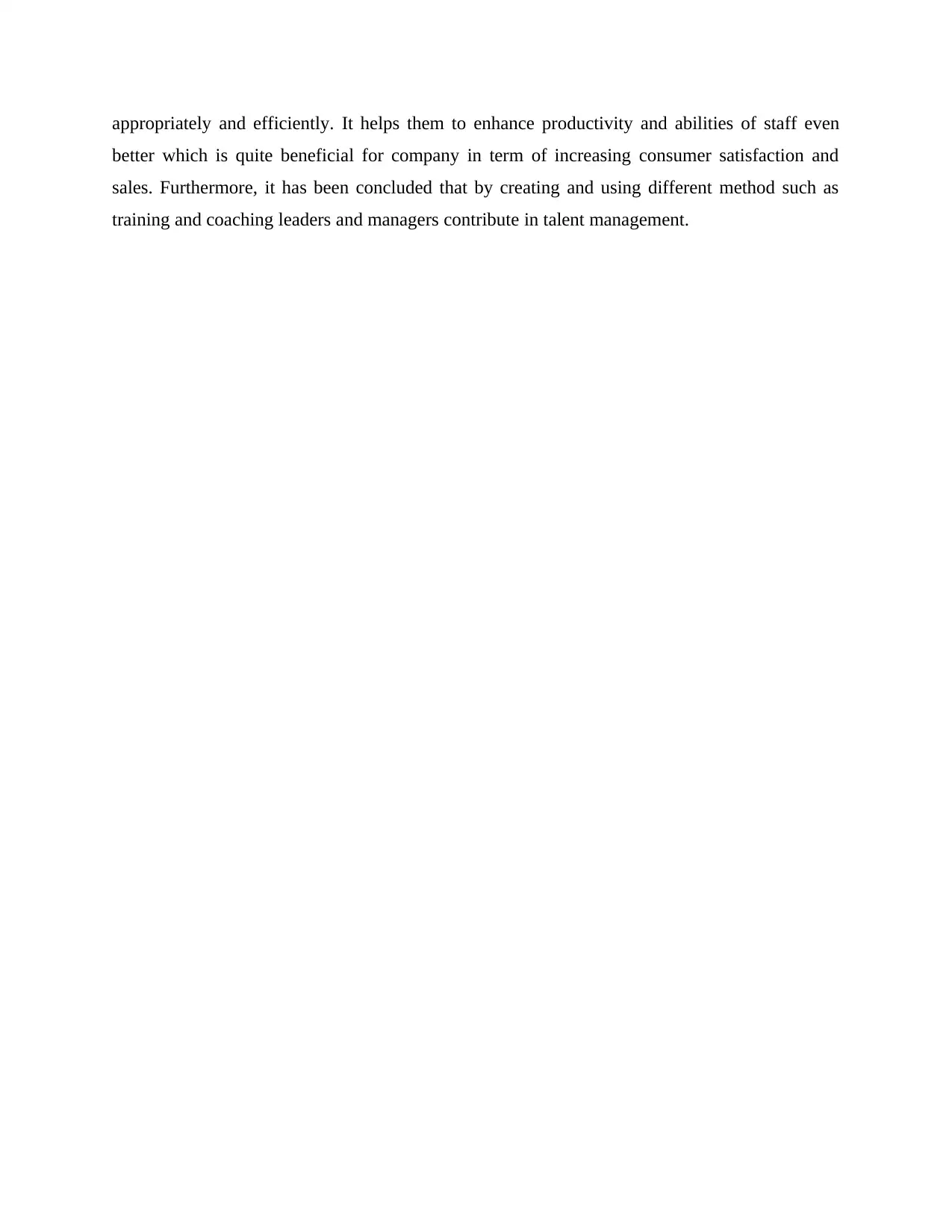
appropriately and efficiently. It helps them to enhance productivity and abilities of staff even
better which is quite beneficial for company in term of increasing consumer satisfaction and
sales. Furthermore, it has been concluded that by creating and using different method such as
training and coaching leaders and managers contribute in talent management.
better which is quite beneficial for company in term of increasing consumer satisfaction and
sales. Furthermore, it has been concluded that by creating and using different method such as
training and coaching leaders and managers contribute in talent management.
Paraphrase This Document
Need a fresh take? Get an instant paraphrase of this document with our AI Paraphraser
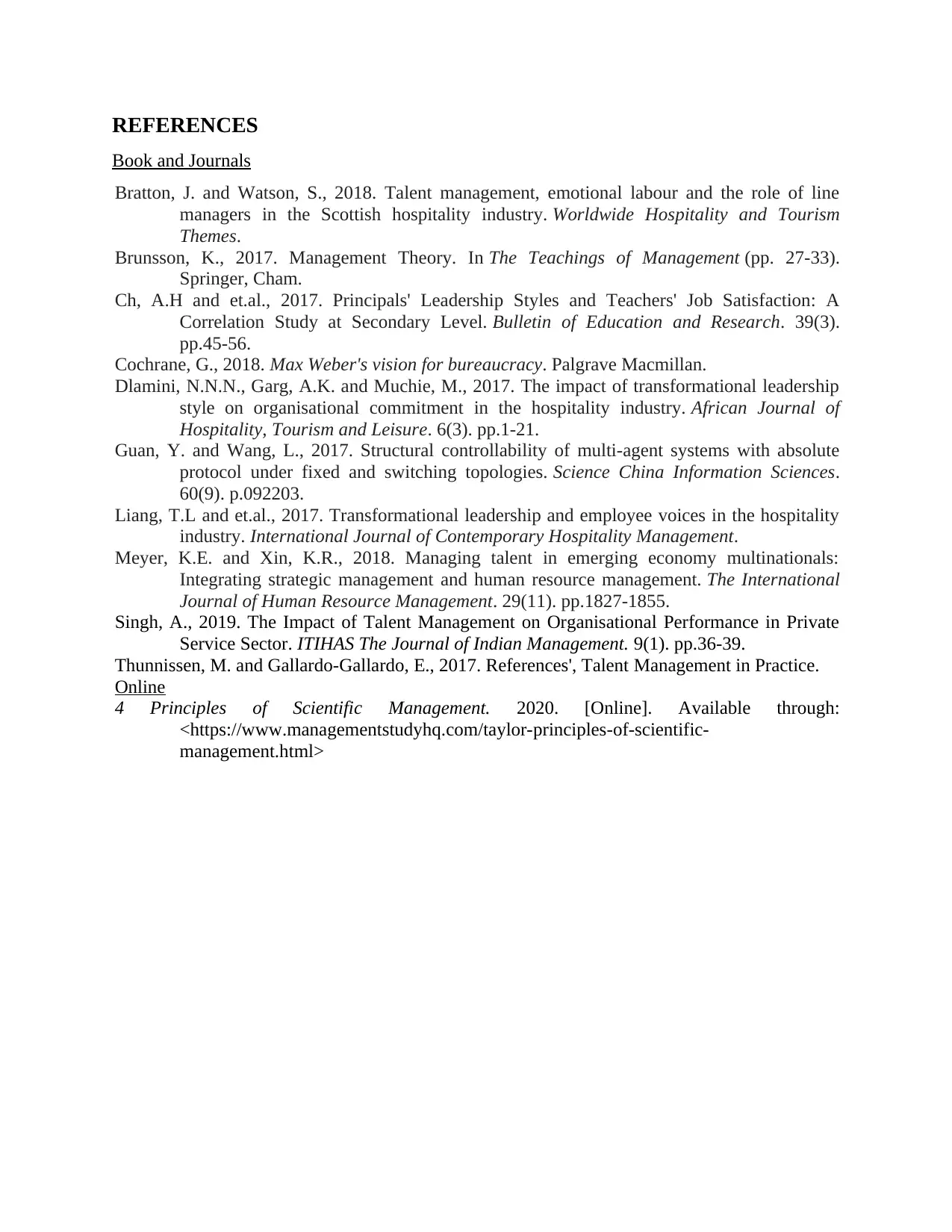
REFERENCES
Book and Journals
Bratton, J. and Watson, S., 2018. Talent management, emotional labour and the role of line
managers in the Scottish hospitality industry. Worldwide Hospitality and Tourism
Themes.
Brunsson, K., 2017. Management Theory. In The Teachings of Management (pp. 27-33).
Springer, Cham.
Ch, A.H and et.al., 2017. Principals' Leadership Styles and Teachers' Job Satisfaction: A
Correlation Study at Secondary Level. Bulletin of Education and Research. 39(3).
pp.45-56.
Cochrane, G., 2018. Max Weber's vision for bureaucracy. Palgrave Macmillan.
Dlamini, N.N.N., Garg, A.K. and Muchie, M., 2017. The impact of transformational leadership
style on organisational commitment in the hospitality industry. African Journal of
Hospitality, Tourism and Leisure. 6(3). pp.1-21.
Guan, Y. and Wang, L., 2017. Structural controllability of multi-agent systems with absolute
protocol under fixed and switching topologies. Science China Information Sciences.
60(9). p.092203.
Liang, T.L and et.al., 2017. Transformational leadership and employee voices in the hospitality
industry. International Journal of Contemporary Hospitality Management.
Meyer, K.E. and Xin, K.R., 2018. Managing talent in emerging economy multinationals:
Integrating strategic management and human resource management. The International
Journal of Human Resource Management. 29(11). pp.1827-1855.
Singh, A., 2019. The Impact of Talent Management on Organisational Performance in Private
Service Sector. ITIHAS The Journal of Indian Management. 9(1). pp.36-39.
Thunnissen, M. and Gallardo-Gallardo, E., 2017. References', Talent Management in Practice.
Online
4 Principles of Scientific Management. 2020. [Online]. Available through:
<https://www.managementstudyhq.com/taylor-principles-of-scientific-
management.html>
Book and Journals
Bratton, J. and Watson, S., 2018. Talent management, emotional labour and the role of line
managers in the Scottish hospitality industry. Worldwide Hospitality and Tourism
Themes.
Brunsson, K., 2017. Management Theory. In The Teachings of Management (pp. 27-33).
Springer, Cham.
Ch, A.H and et.al., 2017. Principals' Leadership Styles and Teachers' Job Satisfaction: A
Correlation Study at Secondary Level. Bulletin of Education and Research. 39(3).
pp.45-56.
Cochrane, G., 2018. Max Weber's vision for bureaucracy. Palgrave Macmillan.
Dlamini, N.N.N., Garg, A.K. and Muchie, M., 2017. The impact of transformational leadership
style on organisational commitment in the hospitality industry. African Journal of
Hospitality, Tourism and Leisure. 6(3). pp.1-21.
Guan, Y. and Wang, L., 2017. Structural controllability of multi-agent systems with absolute
protocol under fixed and switching topologies. Science China Information Sciences.
60(9). p.092203.
Liang, T.L and et.al., 2017. Transformational leadership and employee voices in the hospitality
industry. International Journal of Contemporary Hospitality Management.
Meyer, K.E. and Xin, K.R., 2018. Managing talent in emerging economy multinationals:
Integrating strategic management and human resource management. The International
Journal of Human Resource Management. 29(11). pp.1827-1855.
Singh, A., 2019. The Impact of Talent Management on Organisational Performance in Private
Service Sector. ITIHAS The Journal of Indian Management. 9(1). pp.36-39.
Thunnissen, M. and Gallardo-Gallardo, E., 2017. References', Talent Management in Practice.
Online
4 Principles of Scientific Management. 2020. [Online]. Available through:
<https://www.managementstudyhq.com/taylor-principles-of-scientific-
management.html>
1 out of 11
Related Documents
Your All-in-One AI-Powered Toolkit for Academic Success.
+13062052269
info@desklib.com
Available 24*7 on WhatsApp / Email
![[object Object]](/_next/static/media/star-bottom.7253800d.svg)
Unlock your academic potential
Copyright © 2020–2025 A2Z Services. All Rights Reserved. Developed and managed by ZUCOL.




